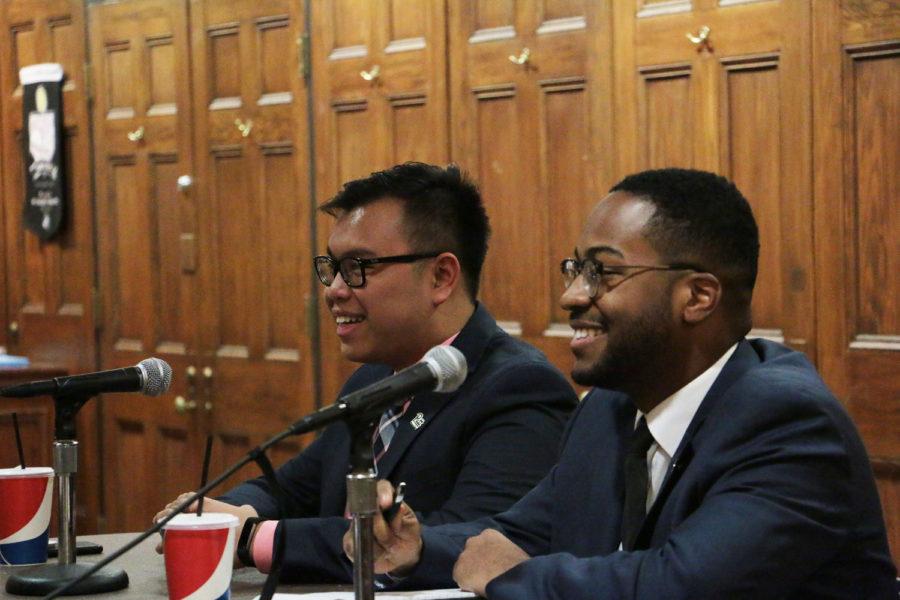Brown, Tanjaya debate for SGB presidency
Hannah Heisler | Staff Photographer
SGB presidential candidates Albert Tanjaya (left) and Zechariah Brown (right) discuss the funding process for Pitt’s clubs at Monday evening’s SGB Presidential Debate.
February 12, 2019
In a quiet corner of the William Pitt Union food court, Taylor Landis hunched over a dining table with her earbuds in, brow furrowed in concentration as she scrawled away at her notes. At the same time, Albert Tanjaya and Zechariah Brown squared off in a debate 50 yards away in Nordy’s Place, vying for one of the most powerful student leadership positions on campus — president of Student Government Board.
“There’s a debate happening right now? I had no idea,” Landis, a junior rehabilitation science major, said. “But I definitely plan to vote in the election next Tuesday.”
SGB’s visibility among the student body was one of many issues Tanjaya and Brown, both juniors, discussed in Monday night’s debate. Moderators Matt Stalford, head writer and host of the Bully PulPitt, and Christian Snyder, editor-in-chief of The Pitt News, asked questions throughout the hour-long contest about each candidate’s prescriptions for improving student facilities and administrative policies.
The audience size ebbed and flowed throughout the night, peaking at around 40 people. And with voter turnout for the past two elections hovering at just above 20 percent, Tanjaya opened the debate by calling for SGB to take a more active role within the student body.
“First we need to increase visibility for student government across campus,” Tanjaya said. “Let’s open our office hours and get away from the WPU, go down to Towers lobby, to Market, to Hillman to just be there for the students we represent.”
Brown nodded in agreement and outlined a concrete plan to march out into the field to talk with students. He advocated holding a monthly sit-down called “Bonding with the Board,” where students could air their grievances about Pitt, inquire about administrative policies and pitch solutions to the president and board members.
SGB’s supposed to be a “megaphone to the administration,” Tanjaya said. He called for more transparency between SGB and students to ensure the administration is hearing students’ complaints. Communication is especially important when it comes to issues like mental health care on campus, he said, because students often don’t know what resources are available to them.
“Students don’t know a lot about the mental health-care facilities that exist on campus,” Tanjaya said. “First we need to educate students about things like the counseling center, then we can identify the improvements we need to make and the money we need to allocate.”
Brown, who serves on the mental health task force with SGB, said he would work one-on-one with University Counseling Center Director Jay Darr, whom the University hired last month, and the administration to improve its accessibility to students.
“We need to make working for the University more attractive,” Brown said. “My biggest step would be to allocate more money to hiring so we can actually build the counseling team students need for their mental health.”
Tanjaya and Brown largely agreed on the major issues — neither candidate used any of the three rebuttals they were given before the start of the debate. But one issue that separated the two was the funding process for Pitt clubs.
Currently, when SGB decides to grant a club a certain amount of money, it stays in a bank account under the Student Organization Resource Center, which must also authorize and verify all the club’s purchases. Tanjaya said the process is often riddled with delays and he wants to simplify allocations with SGB and SORC.
“I have friends at other schools and they say the process for getting money from student government or the university is pretty straightforward,” Tanjaya said. “Allocations often go straight into [a club’s] bank account.”
Brown, by contrast, has no issue with the allocations committee but he thinks SORC is overly bureaucratic. He also wants to cut down on the middleman, which he said imposes unnecessary regulations on club finances.
“SORC doesn’t allow clubs to use things like Venmo,” Brown said. “We do need to streamline the SORC side, but I don’t think there’s anything wrong with the SGB Allocations Committee.”
Brown also outlined another plan to save students money — he wants to form a tenants’ housing union which would represent all students living off-campus to address several concerns he’s heard.
“A lot of students feel like their landlords aren’t responding in time when they have a complaint or request,” Brown said. “A union could also help us work as a collective to reduce the rent in Oakland … There is strength in numbers.”
The housing union was one policy that earned Brown praise from current SGB President Maggie Kennedy.
“[A tenants’ union] is not something I’ve ever heard of before through the lens of SGB,” Kennedy said. “I think it could help a lot of students negotiate for themselves and hopefully save money in housing, too.”
Audience member Sagar Rawal, a junior biological science major, agreed that the housing union stood out, but said both debaters’ pushes for more SGB visibility on campus resonated with him the most.
“The biggest thing was making sure SGB is actively present in the student body,” Rawal said. “Sometimes the SGB offices do seem obscure and inaccessible. Making sure SGB gets out on the floor with students is really important.”
Kennedy echoed Rawal’s point, saying she’s tried hard to have a dialogue with students during her presidency this year. She said both candidates seem qualified to take the reins of student government board.
“I’ve seen them grow a lot this past year, and I think they’re both running for the right reasons,” Kennedy said. “Building off the momentum we’ve tried to create this year … I really believe they’d both be a great mouthpiece for students.”



